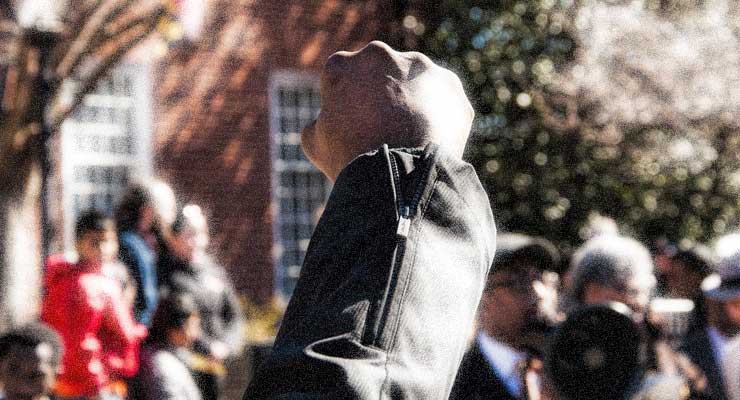
From Voice of America
The arrest of Robertus Robet, a rights activist, a board member of Amnesty International Indonesia, and a university lecturer at the State University of Jakarta, has sparked outrage among rights groups — some of whom called the arrest a reminder of Indonesia’s undemocratic past.
On Wednesday evening, Robet was taken from his house after allegations that he sang a protest song with slightly altered lyrics, that was popular at mass demonstrations during Indonesia’s transition from the authoritarian New Order regime to the current Reform era.
Indonesia’s National Police confirmed his status as a suspect to VOA.
“After investigating him as a suspect, we’ll send him home, because he faces up to only two years in prison,” said Dedi Prasetyo, spokesperson of the National Police. “He will be charged under Indonesia’s criminal code presiding over the contempt of the government or other institutions.”
Dedi added that Robet’s motive “has yet to be known.”
Major General Sisriadi, the military’s head of communications, told VOA that the legal proceedings pertaining to the content of Robert’s oration are now in the hands of the police. “The content itself of course can function as some input to help build the people’s trust in the military,” he added.
Robet has since apologized, telling reporters, he was sorry “if my oration offended or degraded some institutions.”
Puri Kencana Putri of Amnesty International told VOA in a text message that Robert has since left the police complex.
On February 28, Robet sang the song at the Kamisan rally, a weekly peaceful human rights demonstration held in front of the Presidential State Palace in Jakarta every Thursday.
The song was emblematic of civic activism during protests that eventually helped topple the 32-year dictatorship of President Suharto. The song criticizes the presence of the military in civil or non-defense government functions.
Aside from his work as a lecturer, Robet also frequently writes analyses and opinion pieces pertaining to human rights in Indonesia.
Criticism of arrest
Several organizations, activists, and one political party have condemned the arrest. Amnesty International, in a statement, said that the arrest is “detrimental to the law-abiding state and democracy.”
The Indonesian Solidarity Party (PSI) released a statement decrying the arrest. “What he expressed is just a form of his freedom of expression,” wrote Surya Tjandra, PSI’s spokesperson.
Lola Kaban, an activist with the watchdog group Indonesia Corruption Watch said at a press conference Thursday that she attended the Kamisan rally on February 28.
“From what I gathered, Robet just wanted the TNI to be professional,” she said at the Jakarta Legal Aid Institute building.
Saidiman Ahmad, a researcher at the Saiful Mujani Research & Consulting, said that Robet’s song was a symbol of the public’s hatred against the military at that time. “I was one of those activists who sang the song,” he said, before noting that Robet didn’t mean to slander the Indonesian military of today.
The military dual function
Robet intended the song to criticize the recent government’s plan to give military generals slots in civil institutions.
Since the end of Suharto’s regime in 1998, Indonesia entered its current period, the Reform era. The Reform era decidedly embraces democracy. It has also reformed the military in substantial ways.
In 2000, the law to separate the military and the police was enacted. More significantly, in 2004, a law was passed that specifically restricts active members of the military to defense functions only.
The Indonesian military has a long history of deep involvement in civil institutions.
“Later, after the introduction of martial law in 1957, the army and the other branches of the armed forces became deeply involved in politics, civil administration, and economic management…,” wrote the scholar Harold Crouch in his book “The Army and Politics in Indonesia.”
“Hopefully we don’t move backwards. Don’t repeat the instance in which that song was contextual to that particular era,” Lola said. “Today it can be Robet [who was captured], but maybe next, it could be us.”
Leave a Reply